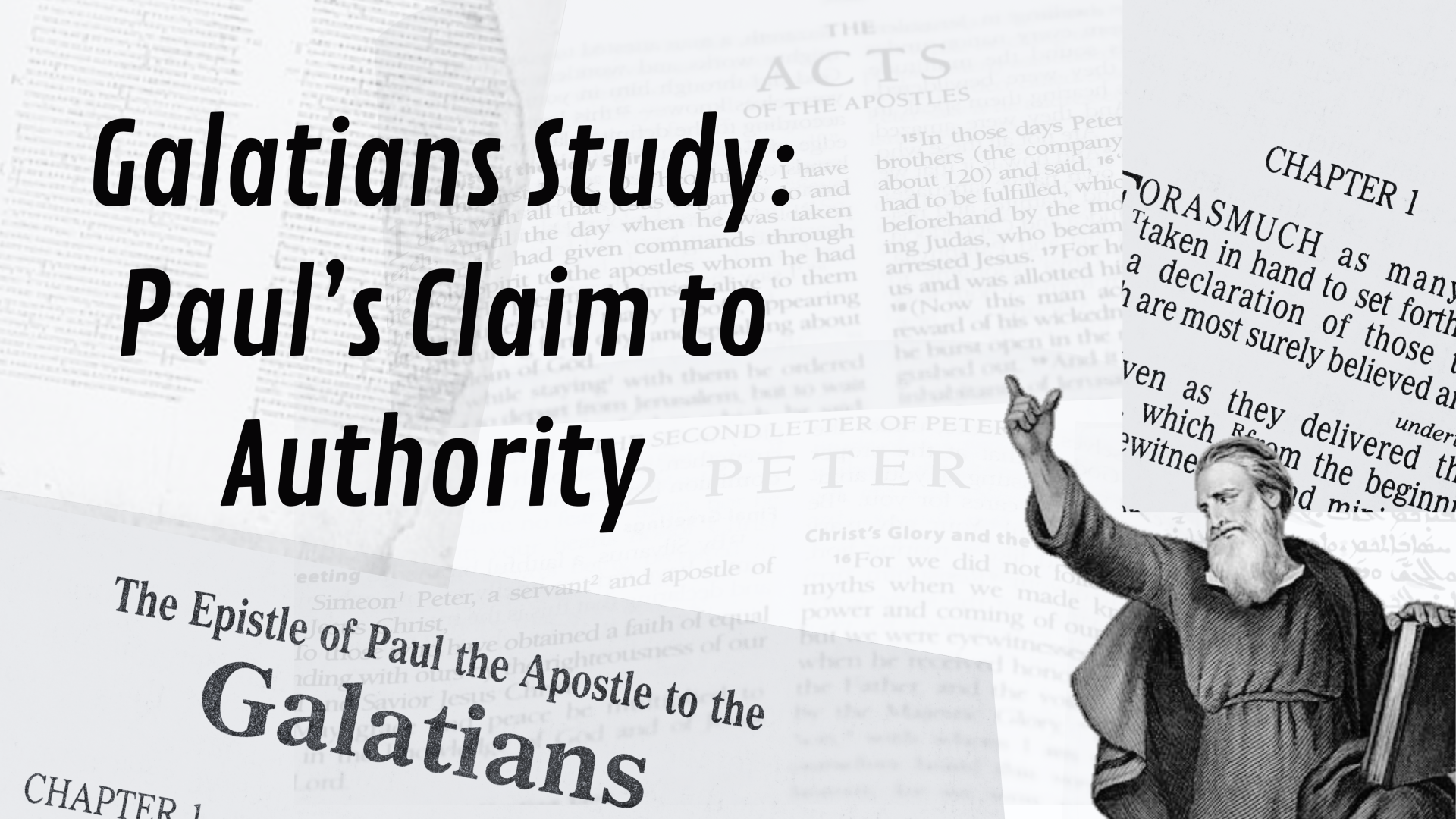Summary: Revelation by Christ Alone
- Paul is a controversial biblical figure that helped build the foundation of the church system we have today. He did this through his letters and missionary work. However, despite the pervasiveness of Paul’s influence on our faith today many wonder why we should listen to Paul. What makes him so special that he can make commandments we have to follow?
- When reading Galatians you get the sense that we weren’t the first ones to ask that question. In this letter we find Paul defending his authority to the churches in Galatia. For him, this is an important mission. He’s fighting to separate his teaching from false teaching. The letter has various ways in which Paul appeals to apostleship. In this article, we will examine his statements and see if he is an apostle. We will hold his claim up to see what other biblical writers had to say about Paul as well as his status in the early church after he died.
- If you want to read more about digging through Paul’s Apostleship in the Book of Galatians you can read, “Paul’s Testimony and Suffering for the Gospel” and “Paul interacting with the Apostles in Galatians.” I believe his testimony and interactions with the other apostles add to his claim of authority.
The Purpose of the Book of Galatians
Galatians was written by Paul to address false doctrine floating around the Galatian Church. It seems that Jewish converts were convincing gentile believers that they needed to practice adherence to Jewish law. These teachers were telling believers that they had to be circumcised. If you remember, in the Book of Genesis, circumcision was the sign of the Abrahamic Covenant (Genesis 17). This sounds innocent, but if we were made right by the law then what would be the point of Jesus Christ’s death? To emphasize adherence to the law would undermine the significance of the gospel.
Paul will take the time in this letter to explain why we no longer adhere to the law but are now living by the Spirit of God. By following the Spirit we are transformed and produce, “the fruit of the Spirit (Galatians 5:22-23)” This fruit ultimately distinguishes us from those who do not live according to the Spirit.
This fascinating letter is relevant today. The letter to the Galatians provides us with a way to deal with false doctrines and to live as a follower of the Messiah. Helping readers identify the gospel from a fake gospel. As well as the works of the flesh vs the works of the Spirit. This is still important to us today as you can find many individuals online who want to disprove Paul so that they don’t have to follow what he taught.
The Authorized Agent
This letter is from Paul, an apostle. I was not appointed by any group of people or any human authority, but by Jesus Christ himself and by God the Father, who raised Jesus from the dead. All the brothers and sisters here join me in sending this letter to the churches of Galatia.” Gal 1:1-2 NLT
Paul is giving you his credentials here. He is an apostle, but not one given that title by other men. He is an apostle with the title given by Jesus who our faith is founded upon. Using the 2016 Lexham Bible Dictionary, apostle means, “someone sent as an authorized agent by Jesus or the Christian community.” The keywords here are authorized & agent. Because someone who has agency has legal permission to act on someone else’s behalf. If Paul can be qualified as an apostle then what Paul says in this letter is as important as if Jesus had said it; given his agency. Paul does follow up on his claim in 1:1-2 with an affirming statement in 1:11-12. He will let us know without a doubt he believes his preaching was a revelation from Jesus.
“Dear brothers and sisters, I want you to understand that the gospel message I preach is not based on mere human reasoning. I received my message from no human source, and no one taught me. Instead, I received it by direct revelation from Jesus Christ.” Gal 1:11-12 NLT
Again if Paul is an apostle then what Paul says in his letters we should take as a direct extension of what Christ has to say. When looking at Paul I asked myself, “Do others support Paul’s claim to being an apostle?” I looked and I believe the three areas below answer my question:
- What Luke says in the Book of Acts
- What Peter says in 2 Peter
- What the early church fathers had to say
Now, before I get into any of the evidence I want to say that in our entire New Testament no one refutes Paul. No one says Paul is not a real apostle. No one says he is a false teacher. James, Jude, Peter, Luke, John, or the writer of Hebrews say nothing to refute Paul. The only place where people try to find dissension against Paul’s teaching is in the Book of James. Some people say that James teaches was saved by his works and Paul teaches he was saved by his faith. However, Paul is speaking of Abraham’s initial faith in God when he was called away from his people. James is showing you that because Abraham believed he was willing to show his faith when God had him bring Isaac up to the mountain.
What Does Luke Have to Say?
“Almost universally, scholars agree that the Gospel of Luke and the Acts of the Apostles were written by the same person, making Luke the single largest contributor to the NT (twenty-eight percent of the whole).” – Green, 2013
The above quote was from the Dictionary of Jesus and the Gospels (The IVP Bible Dictionary Series). I believe this quote sets the stage for recognizing how important Luke was. But now let us ask who Luke is? Well, Luke was a gentile man. He was mentioned by Paul as, “the beloved physician,” in the Book of Colossians (Col 4:14). We know that he traveled with Paul and had fellowship with the other believers (Phlm 24). He was also known as Luke the Evangelist and was helpful in spreading the Gospel in the early church. Luke did eventually end up becoming a martyr for the Gospel, being hung by an olive tree according to some accounts.
With all of that being said we know Luke was a significant figure during the time period after Christ died. He was willing to gather first-hand accounts and track people down to get the Gospel story and record the beginning of the Church. In all, Luke’s work accounts for 28% of the New Testament.
So, what does Luke have to say about Paul? It seems that the Book of Acts was set up in a way to draw a parallel between Peter and Paul. This quote from a paper published on the topic says the following:
“Luke documents that both men healed a man who was lame from birth (3:1-11, 14:8-10) and were gifted with unusual means of healing (5:15- 16, 19:11-12). Peter and Paul experienced Jewish opposition (5:17, 13:45). Acts records them both opposing a sorcerer (8:18-24, 13:6-11), raising the dead (9:36-41, 20:9-12), and bestowing the Holy Spirit through the laying on of hands (8:14-25, 19:1-10). Peter and Paul were both miraculously released from prison (12:1-19, 16:16-34) and they were both mistakenly worshiped (10:25, 14:11-13). Both men rendered swift judgment (5:1-11, 13:6-11), received an angelic visitation (12:7-11, 27:23-24), heard the voice of God (10:13-16, 9:4-6), were filled with the Spirit (2:1-4; 4:8; 9:17; 13:9), and preached with boldness (4:13, 31, 9:27-29).” – Seltzer, 2021
While examining the above quote it appears that Peter and Paul have strikingly similar ministries. If this was a divine plan by God (and I believe it was), then God led both these men to parallel each other. In doing this, Paul is qualified as truly called through the way God led both Paul and Peter. If you want to dive into this parallel I encourage you to peer through all of the verses highlighted by Seltzer. In those 20 plus verses you will find that Seltzer’s point of making a divine parallel is evident.
To keep our examination of Acts rolling we turn our attention to Acts 9:15-17. In this passage we will see an account of the disciple Ananias saying that Jesus himself said that Paul is a chosen instrument.
Acts 9:15-17 (NIV): “But the Lord said to Ananias, “Go! This man is my chosen instrument to proclaim my name to the Gentiles and their kings and to the people of Israel. I will show him how much he must suffer for my name.” Then Ananias went to the house and entered it. Placing his hands on Saul, he said, “Brother Saul, the Lord—Jesus, who appeared to you on the road as you were coming here—has sent me so that you may see again and be filled with the Holy Spirit.”
Then Barnabas, who was an apostle, confirms in 9:26-27 that Paul was chosen.
Acts 9:27 (NIV): “When he came to Jerusalem, he tried to join the disciples, but they were all afraid of him, not believing that he really was a disciple. But Barnabas took him and brought him to the apostles. He told them how Saul on his journey had seen the Lord and that the Lord had spoken to him, and how in Damascus he had preached fearlessly in the name of Jesus.”
In Acts 14:14 Luke simply calls Paul an Apostle, “But when* the apostles Barnabas and Paul heard about it.” It would appear that we have a massive list of evidence to witness to Paul’s authority in Acts. We have the Risen Christ, Barnabas an Apostle, Ananias the Disciple, and Luke the Evangelist. However, it is logical to say, “Well that’s great, but Luke was most likely converted by Paul, so of course Luke would support him.” To that, I would say Luke is not the only one in the Bible to affirm Paul. We can look at 2 Peter.
2 Peter – “The Beloved Brother”
2 Peter was written by the apostle Peter or Simon Peter. He was 1 of the 12 disciples of Christ while he was alive during his earthly ministry. Peter was given authority to spread the Gospel and build the Church after Christ’s death and resurrection. He preached and ministered the Gospel to Jews mainly, but did have important work in bringing it to the Gentiles (Acts 10:34-46). We also see from Galatians that Paul and Peter interact and do ministry together simultaneously in the same place (Gal 2:11-14).
2 Peter 3:15-16 (NIV): “And count the patience of our Lord as salvation, just as our beloved brother Paul also wrote to you according to the wisdom given him, as he does in all his letters when he speaks in them of these matters. Some things in them are hard to understand, which the ignorant and unstable twist to their destruction, as they do the other Scriptures.”
As we can see here Paul is being affirmed as a beloved brother. Peter is also pointing his readers toward the letters of Paul. He lifts up Paul by speaking of his letters containing wisdom given by our Lord. He also helps make them authoritative by pointing out that they have equality with all Scripture.
It is important to mention that the current scholarship consensus is that 2 Peter was pseudepigraphical. Truth be told 2 Peter is the most debated book by critics in the bible. However, I have pushback and will link an article with an in-depth study of 2 Peter.
My pushback is that it was widely accepted until recent times that 2 Peter was written by Peter, early church fathers quoted 2 Peter, 2 Peter could have been composed with a different scribe than 1 Peter or Peter wrote 2 Peter which is why the writing style is much more baroque. I would also say that scholarship has come to a consensus on something and has been completely wrong many times.
Now that we have examined Acts and 2 Peter it would be logical to say, “While all of that is great we are justifying Paul based upon internal biblical evidence. What do people outside of the biblical writers have to say?” To find answers to this question we can turn our attention to the early church fathers. We will examine Clement, Ignatius, and Polycarp.
The Church Fathers & Early Church History
“Let us set before our eyes the good Apostles. There was Peter who by reason of unrighteous jealousy endured not one not one but many labors, and thus having borne his testimony went to his appointed place of glory. By reason of jealousy and strife Paul by his example pointed out the prize of patient endurance. After that he had been seven times in bonds, had been driven into exile, had been stoned, had preached in the East and in the West, he won the noble renown which was the reward of his faith, having taught righteousness unto the whole world and having reached the farthest bounds of the West;” 1 Clement
This letter has been widely accepted by scholars to have been written by one of the early church elders in Rome, Clement I. Clement wrote this letter around 96 AD to speak to the Corithian church. This letter seems to show that after Paul’s death, he is still supported as an Apostle and in the same conversation as Peter. It also shows how much honor Paul had in the early church.
“I do not, as Peter and Paul, issue commandments unto you. They were apostles of Jesus Christ, but I am the very least [of believers]: they were free, as the servants of God; while I am, even until now, a servant. But when I suffer, I shall be the freed-man of Jesus Christ, and shall rise again emancipated in Him. And now, being in bonds for Him, I learn not to desire anything worldly or vain.” The Epistle of Ignatius to the Romans
If we move to another early church writer and leader we can look at Ignatius of Antioch. He was the third bishop of Antioch and was sentenced to death in Rome. He was famously killed by beasts in the Roman amphitheater. He had dialogue with many churches in Asia Minor and he wrote letters to Ephesus, Magnesia, Tralles, and Rome, Philadelphians, Smyrnaeans, and Polycarp the bishop of Smyrna.
He is regarded as a martyr hero in the church and he is still celebrated by Roman Catholics. Ignatius is clear in what he is saying about Paul. Peter and Paul had the agency to issue commandments to believers, unlike him even though he is a leader at Antioch. Ignatius also says simply that Paul was an Apostle of Christ. This would be the second writer to hold the same exact position on Paul’s authority. But let us look at one more writer.
“For neither I, nor any other such one, can come up to the wisdom” of the blessed and glorified Paul. He, when among you, accurately and steadfastly taught the word of truth in the presence of those who were then alive.” The Epistle of Polycarp to the Philippians Chapter III
“before your eyes, not only in the case of the blessed Ignatius, and Zosimus, and Rufus, but also in others among yourselves, and in Paul himself, and the rest of the apostles.” The Epistle of Polycarp to the Philippians Chapter IX
“If a man does not keep himself from covetousness, he shall be defiled by idolatry, and shall be judged as one of the heathen. But who of us are ignorant of the judgment of the Lord ? “Do we not know that the saints shall judge the world ?” as Paul teaches.” The Epistle of Polycarp to the Philippians Chapter XI
The excerpts from above were written by Polycarp. As we saw before Ignatius wrote to Polycarp. Polycarp oversaw the Church of Smyrna. We know he lived from 70 AD to 155 AD where he was eventually martyred. In Polycarp’s writings, we can find over 20 references to Paul’s works ranging from Romans to II Timothy. We can examine from the text above that Polycarp believed Paul taught the truth, that he was an apostle, and he taught what Paul taught.
It appears that the three church leaders we examined are all in agreement about the apostleship of Paul and his teaching. In our examination of Paul trying to refute the false teachers in Galatia it’s important to point out that none of these church leaders are teaching or exemplifying the teachers bringing people under the law. None of these church leaders have anything negative to say about Paul. I would assume that the consensus is Paul is who he says he is.
If you believe in Jesus just believe the bible…believe Paul
With all of what we examined, we can see that Paul is an Apostle. Since we’ve done a lot of reading in this article I will just bullet point our evidence:
- Not a single biblical author in the NT tries to refute what Paul taught. No one seeks to discredit him as an Apostle
- The Book of Acts shows us that Ananais the Disciple heard from Jesus that Paul would become his chosen instrument. Which disturbed Ananais since Paul was persecuting the church.
- The Book of Acts shows us that Barnabas the Apostle supported Paul’s claim and Luke simply calls Paul an Apostle in Acts 14:14.
- 2 Peter 3:15-16 shows us that the Apostle Peter says Paul’s words are equivalent to scripture and affirms him as a beloved brother.
- The early church leaders like Clement, Ignatius, & Polycarp taught that Paul was an apostle long after Paul died.
If you believe in the Bible and if you believe that the Bible is the word of God. Then we should take Paul’s words seriously. We should recognize Paul’s apostleship. We should recognize that no early Christian refuted Paul and neither should you. I will do a much longer study on Paul’s Apostleship. I will try to answer questions about Paul and his ministry in more depth. Until then I pray this article blessed you!







